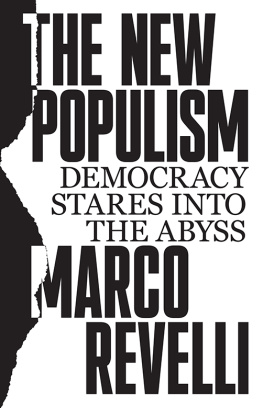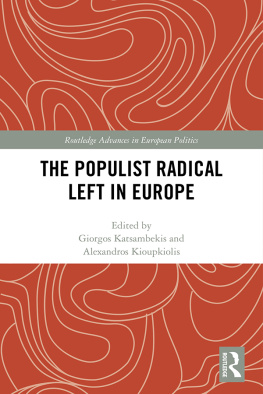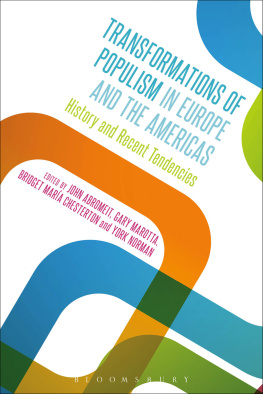Contents

THE NEW
POPULISM
Democracy Stares into the Abyss
MARCO REVELLI
Translated by David Broder

This English-language edition published by Verso 2019
Originally published in Italian as Populismo 2.0
Einaudi 2017
Translation David Broder 2019
All rights reserved
The moral rights of the author have been asserted
1 3 5 7 9 10 8 6 4 2
Verso
UK: 6 Meard Street, London W1F 0EG
US: 20 Jay Street, Suite 1010, Brooklyn, NY 11201
versobooks.com
Verso is the imprint of New Left Books
ISBN-13: 978-1-78873-450-9
ISBN-13: 978-1-78873-451-6 (UK EBK)
ISBN-13: 978-1-78873-452-3 (US EBK)
British Library Cataloguing in Publication Data
A catalogue record for this book is available from the British Library
Library of Congress Cataloging-in-Publication Data
A catalog record for this book is available from the Library of Congress
Typeset in Fournier MT by Hewer Text UK Ltd, Edinburgh
Printed and bound by CPI Group (UK) Ltd, CR0 4YY
Contents
A spectre is haunting the world: populism. Thus claimed two leading humanities scholars, Ghita Ionescu and Ernest Gellner, in their introduction to what remains one of the most important and complete reviews of the populist phenomenon (Populism: Its Meaning and National Character). Writing in the 1960s, they were here referring to the peripheral countries that were emerging from colonial domination and underdevelopment to chart their course toward independence.
A decade ago, this statement suddenly became relevant again and this time it did not apply to the peripheral countries, but to the centre itself. Indeed, in 2012, the political scientist Ivan Krastev quoted it at the beginning of what has become something of a canonical work. In his essay, he illustrated his theses on what he called the populist moment, or rather, presented our time as the age of populism. For Krastev, populism has become the most significant movement in contemporary politics.
Today, however, this expression has taken on much more concrete meaning. The spectre has assumed bodily form a massive, muscular figure as so-called populism has dealt a series of heavy blows at the door of the Western democracies. They have followed one after another, from the Brexit referendum and Donald Trumps election in the United States in 2016 to the challenge mounted by Marine Le Pen and her Front National in the 2017 French presidential election, and the great fears that this sparked. The latest blow came with the earthquake of the 4 March 2018 Italian elections and the establishment of an openly populist government in Rome. And that is not to mention the many smaller pieces of the puzzle, from Hungary to Poland, Slovakia, Slovenia and Austria: the countries along Europes eastern spine where, falling like dominoes, one government after another has been conquered by political forces that can be classified or in any case, have been classified as populists. And, here, this means a populism riddled with xenophobia and strongly hostile to the last generation of civil rights measures.
Everywhere in the West, political systems have been shaken. They have been shaken by challengers that, while not taking an explicitly hostile stance toward democracy, seem to have risen from its bowels to point an accusing finger at some kind of deficit, and demand what Michel Foucault called its excedence. In any case, these challengers are a dynamic force driving a rupture in all of democracys established systemic balances. It is as if there were some unresolved, ambivalent link, combining complicity and conflict, between the institutional order of democracy and a challenge emanating from society itself. It is hard to predict the ultimate results of such a tension. Its outcome remains often dramatically uncertain, in a historical moment in which there is enormous pressure on politics itself (qua system for the authoritative regulation of social relations).
An odd couple
The truth is that democracy and populism are interlinked by an unbreakable connection. An original one: they have common roots. Demos in Greek and populus in Latin refer to the same subject: the people. And they thus refer to what is, in large part, a common destiny. For when the people are hurting, democracy suffers too
Here, therefore, we will discuss populism first of all as a symptom of a deeper illness even if one we are too often silent about of democracy itself. It is the outward manifestation of a sickness in the contemporary form of democracy the only one that has established itself in modernity, erected over the ruins of participatory utopias that is, representative democracy. Whenever some part of the people, or an entire people, does not feel represented, it returns to one or another kind of reaction that takes the name populism. Early in democracys development, this reaction appeared as its infantile disorder, when limited suffrage and class barriers kept part of the citizenry out of the game (late nineteenth- and early twentieth-century populism was, in large measure, a revolt of the excluded). Today, it manifests itself as a senile disorder of democracy. For the thinning-out of democratic processes and the return of oligarchic dynamics at the heart of the mature democracies marginalise or betray the mandate of a people whose sceptre
A catch-all term
It cannot be denied. The term populism, such as it is used in political debate and journalistic commentary today, has become almost unusable, given how imprecisely it is used and with such an enormous variety of meanings (all of them pejorative). As two authoritative scholars of this phenomenon have noted, the definition of populism is a bit like the Welsh poet and playwright Dylan Thomass sarcastic definition of an alcoholic as someone you dont like who drinks as much as you do: a populist is someone who uses a political style not much different from yours, but who you dont like
We could also characterise populism as a catch-all term that takes in all sorts of things as if they all shared some common essence. It takes in the old like the new, yesteryears manifestations of radical protest like todays (or perhaps tomorrows) forms of electoral revolt; the Russian populists of the nineteenth can take in such a wide repertoire of political phenomena; it thus risks doing nothing to help us understand them clearly.
So, first of all, we need to try to restore some order to our definitions themselves. And to set out some conceptual and chronological boundaries. At this point, we are talking about plural populisms more than populism in the singular, given the multiplicity of experiences that fall under this term, and which cannot and the populism that is emerging today. Namely, what we here call populism 2.0, which is to say a new generation of populism, what we should call a second or rather, third generation populism in order to underline its new and unprecedented characteristics. Or the wholly new ways in which some of the traditional aspects of populism have been taken up again amidst the convulsions of the turn of the century. A new world that has been explored only in part.
Post-democracy
But now we need directly to tackle the live matter of the malaise. We face a crisis of democracy (of representation, of legitimation, of sovereignty) without doubt much more serious than we are usually prepared to admit. The situation is serious enough that alluding to the somehow terminal character of todays illness: that is, to the ever more entrenched oligarchic distortion that democracy is subject to, whereby it becomes ever less representative and ever more executive. We need to contend with the underlying social crisis, the real hypocentre a point of deep rupture of the earthquake that is shaking our political order; and so, too, challenge the way in which it has rapidly coalesced, redrawing the structure of classes and social groups with the widespread













